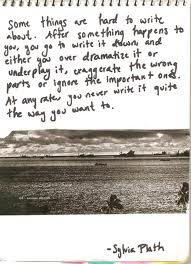-Ted Hughes, from his foreword to The Journals of Sylvia Plath, 1982
 |
| The cover of my edition of the journals; notice one side the words, one side the woman... |
As evidenced in Hughes' quote, Plath struggled to find her voice as a writer. This effort suffered from her desire to be published and popular. She often had to tailor or temper her natural style and content to produce what publications wanted. Hughes even went so far as to claim that all but Ariel and the later poems, along with her journals, were the only representation of her true "voice," and that all her other writings were the "waste products" left along the way to finding that voice.
 |
| Sylvia and Ted (AKA Bill Pullman's twin) |
"A real self, as we know, is a rare thing. The direct speech of a real self is rarer still. Where a real self exists it reveals itself, as a rule, only in the quality of a person's presence, or in actions. Most of us are never more than bundles of contradictory and complementary selves. Our real self, if our belief that we have one is true, is usually dumb, shut away beneath the to-and-fro conflicting voices of the false and petty selves. As if dumbness were the universal characteristic of the real self. When a real self finds language, and manages to speak, it is surely a dazzling event-as Ariel was."
It's important to note that Hughes uses the word "dumb" not in the modern sense that we would, but to mean "mute" as was a common understanding of the word in his generation. He's saying that our true selves are silent, and only once in a great while can that silence find an authentic voice and be shown to the rest of the world. It seems that to get by in a society, to get along with others, we must be "false and petty." I find this to be true, particularly in the American culture. Every time I wrote a journal entry when I was younger, I did it with the notion in mind that someday, someone would read it. I was afraid to write anything too "true," too real. I found myself tempering everything about what I wrote, from the technique to the content, out of fear of being "found out." The writing wasn't true to me, but I was afraid to show "me," anyway, so into the garbage it all went.
 |
| Tell me about it. |
[Cue end of cliche]
 |
| Even Plath wore a bikini |
No comments:
Post a Comment